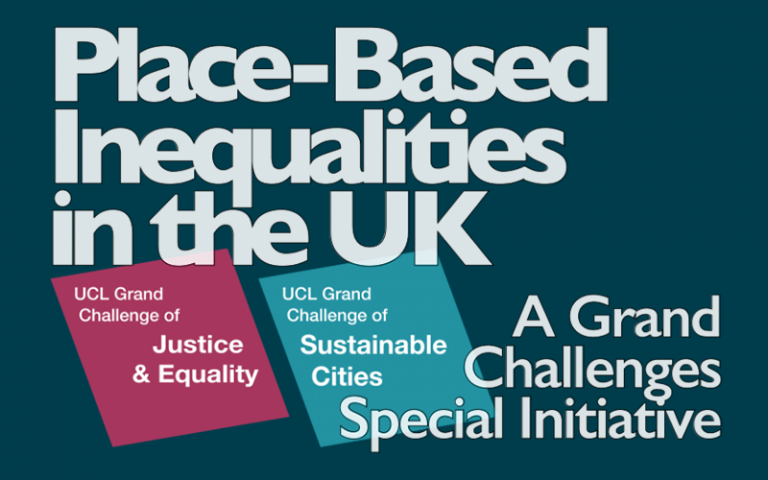UCL Grand Challenges has recently announced awards of a call to study the issue of 'Place-based Inequalities in the UK'.

UCL's Grand Challenge of Justice & Equality (GCJE) and Grand Challenge of Sustainable Cities (GCSC) will jointly deliver the 2019-20 special initiative: Place-based Inequalities in the UK. The initiative follows on from GCJE’s Exploring Inequalities: igniting research to better inform UK policy project in academic year 2018-19.
As part of this initiative, GCJE and GCSC has awarded support to the value of £23,000 to three research projects. The funded projects will aim to address the nature and impacts of place-based inequalities and explore joined-up solutions to addressing inequalities in UK society.
Understanding 'left-behind' Places: Towards a deep-place study
£10,000
- Prof John Tomaney—School of Planning (Bartlett)
- Dr Lucy Natarajan—School of Planning (Bartlett)
- Dr Florence Sutcliffe-Braithwaite—History (SHS)
This pilot project will develop an interdisciplinary, multi-annual, large-scale programme of ‘deep-place’ research/action to obtain a rich, historically-grounded understanding of the long-term trajectory of a particular left-behind town or village.
The project, focuses on County Durham, builds on developing networks with local actors and considers how new solutions aimed at improving social and economic conditions can be co-produced with local communities using expertise at UCL and elsewhere.
> Understanding 'Left-behind' Places: Developing a Deep Place Study
Young People's Place-based Stories of School Exclusion: Developing a community-based response
£11,000
- Prof Martin Mills—Centre for Teachers and Teaching Research (IoE)
- Dr Zachary Walker—Pschology and Human Development (IoE)
- Dr Antonina Tereshchenko—Curriculum, Pedagogy and Assessment (IoE)
- Dr Jake Fairnie—Psychology and Language Sciences (Brain Sciences)
This project will address the issue of school exclusion as a place based inequality through prioritising young people's voices and engaging with community representatives. The project will use theatre and storytelling to draw on the experience of young people excluded from school and being educated in alternative provision.
The report of the project and a ‘digital toolkit’ detailing the stories and research process will be publically available and will serve as resources for those working in the area of school exclusion, for example, researchers, ITE classes, continuing professional development for teachers, policymakers, and other key actors in the area.
> Young People's Place-based Stories of School Exclusion
Longitudinal Area Effects Network & Data Linkage Workshop
£2,000
- Dr Stephen Jivraj—Institute of Epidemiology and Health Care (Population Health Sciences)
- Dr Emily Murray—Institute of Epidemiology and Health Care (Population Health Sciences)
- Dr David Church—Centre for Longitudinal Studies
- Dr Gabriella Conti—Economics (S&HS)
- Rory Coulter—Geography (S&HS)
- Adam Dennett—Centre for Advanced Spatial Analysis (Bartlett)
There is currently no central resource available to researchers who are interested in geographical analysis using the major UK longitudinal social surveys. Such a resource is crucially important to researchers who are interested in how places affect people and central to place-based inequalities in the UK. There is no shortage of political interest in area effects. Policy papers from every national UK administration as far back as 1997 have stated that where you live should not affect your life chances.
The proposed activity will involve two workshops. The first workshop will exemplify the application of geographically linked data to longitudinal surveys from a range of researchers in the UK and internationally. The second workshop will bring together the custodians of UK longitudinal surveys with the aim of overcoming barriers to access for researchers.
> Longitudinal Area Effects Network & Data Linkage Workshop

 Close
Close

